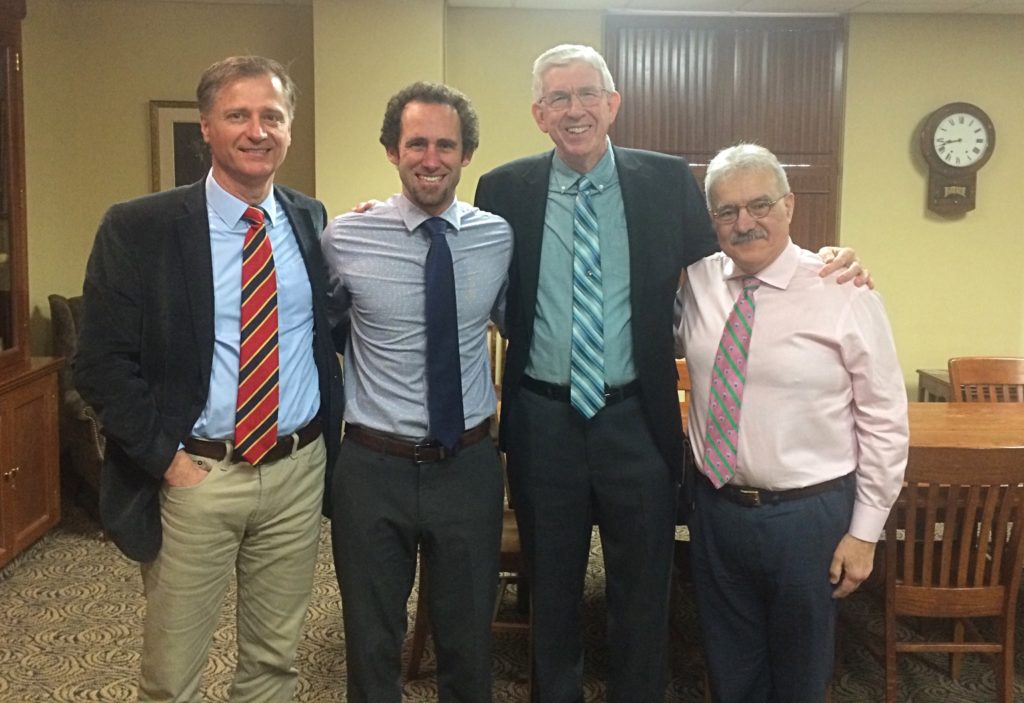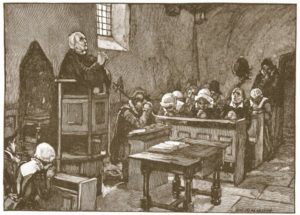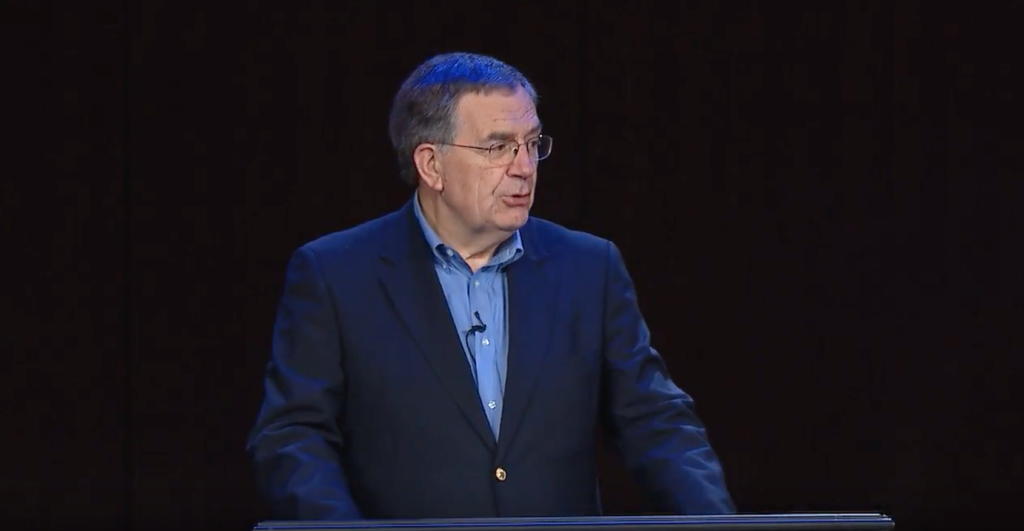
Gospel ministers are meant to be models of holiness. Paul commands us to “set an example” (1 Tim. 4:12). One commentator says on this passage, “The word picture it paints is not so much Timothy is an example that others can emulate but that he is a mold that should be pressed into the lives of others so that they attain the same shape.” Just like a cookie cutter molds the dough into its shape, so is the pastor’s character to shape the lives of his people.
But where can we find encouragement when we realize our mold is not as sharp as it should be?
Noticeable Progress Please
For a variety of different reasons, I’ve been in a three-month-long process of introspection to start 2018. Many things are coming to an end in my life. The dissertation is done. After having our sixth child in December, we are likely done having children. I’m in the midst of a new pastorate and so have reflected on past ministerial experiences in an attempt to discover where I must grow. I’m asking questions about trajectory in pastoral labor, seeking to find areas that need attention.
The self-examination has brought several points of encouragement. But, on the whole, I’ve found myself dissatisfied with my progress in godliness. My life has no small number of places in which I have to grow to be faithful in the gospel ministry: prayer, kindness, trust, and hope for eternity. As M’Cheyne said, “I earnestly long for more grace and personal holiness, and more usefulness.”
My convictions on these matters only increased as I reread a section from W. G. T. Shedd’s Homiletics and Pastoral Ministry.
Eminent Spirituality Demanded
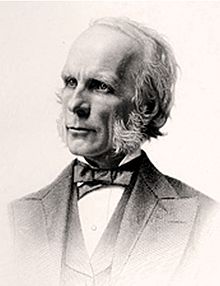 I discovered Shedd’s volume in 2016. Rarely does a week go by without something from his work popping into my mind. Most often, it is his three fundamental properties of sermon style—plainness, force, and beauty. I also remember regularly his chapter titled, “Religious Character and Habits of the Clergyman.”
I discovered Shedd’s volume in 2016. Rarely does a week go by without something from his work popping into my mind. Most often, it is his three fundamental properties of sermon style—plainness, force, and beauty. I also remember regularly his chapter titled, “Religious Character and Habits of the Clergyman.”
Let me see if I can encapsulate his argument for you.
Shedd begins with a declaration: “The foundation of influence in parochial life is in the clergyman’s character, and the root of clerical character is piety.” A congregation’s maturity rarely, if ever, exceeds that of its minister(s). Therefore, the pastor’s primary preoccupation is enlarging his soul’s love for Christ. As Shedd says,
The calling and profession of the clergyman demand eminent spirituality. An ordinary excellence is not sufficient. The Christian minister, by his very vocation, is the sacred man in society.
Shedd is careful to tell that a minister is not a member of a sacred caste, but he nonetheless belongs to a sacred profession. His character must reflect his calling:
He is the marked and peculiarly religious man, in the community. His very position and vocation, therefore, make it incumbent upon him to be eminently spiritual.
I’ve found that many pastors today find such demands for holiness grating or even unreasonable. To contemporary minds, Shedd’s assertions may sound inauthentic or sacerdotal. One brother told me that such a view of pastoral godliness tends to promote legalism. Another said it creates a yoke that pastors cannot possibly bear.
Eminent Spirituality Produced
Shedd, however, is more optimistic. My bother pastor, read the following paragraph slowly and be edified:
Not only does the ministerial calling and profession require eminent piety, but it tends to produce it. By his very position, the clergyman is greatly assisted in attaining to a superior grade of Christian character, and if, therefore, he is a worldly and unspiritual man, he is deeply culpable. For, so far as his active life is concerned, his proper professional business is religious. The daily labor of the clergyman is as truly and exclusively religious, as that of the farmer is agricultural, or that of the merchant is mercantile. This is highly favorable to spirituality. Ought not one to grow in grace, whose daily avocations bring him into communication with the anxious, the thoughtful, the convicted soul, the rejoicing heart, the bereaved, the sick, and the dying? Ought not that man to advance in the love and knowledge of God, whose regular occupation from day to day it is, to become acquainted with the strictly Religious wants, and condition of the community, and to minister to them? If the daily avocations of the mechanic have a natural tendency to make him ingenious, and inventive, if the daily avocations of the merchant tend to make him enterprising, and adventurous, do not the daily avocations of the clergyman tend to make him devout? The influence of active life upon character is, in its own place and manner, as great as that of contemplative life. A man is unconsciously moulded and formed by his daily routine of duties, as really as by the books he reads, or the sciences he studies. Hence, a faithful performance of clerical duties contributes directly to spirituality.
Surely Shedd is right to say the gospel ministry is uniquely conducive to noticeable growth in grace. Faithful ministers trade in and thrive on the means of grace. Should grace not tend to flourish in our lives? As the professor also says, “The studies of the theologian and preacher work directly towards the growth of piety.”
The Progress Will Come
Maybe you’re like me; you examine your growth in godliness and find it wanting. Find hope today! Christ has commissioned you as a servant in his house (1 Tim. 4:6). He indwells you through the Spirit—the Spirit of holiness (Rom. 1:4). He’s handed you a job description that requires you to immerse yourself in the means of grace “so that all may see your progress” (1 Tim. 4:15).
Steadfast service for the King will bring increasing conformity to His image (Col. 3:9–10). Let us repent of our failings and rise assured that the grace which forgives is the grace that empowers.


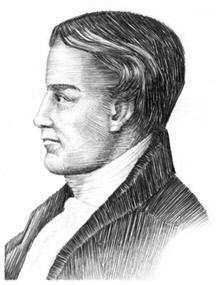

 I believe one of the most significant needs in our time is a revival of Christ-centered, sinner-saving, and saint-sanctifying piety in the ministry. Perhaps the decline we continue to see in the Church’s spirituality is a direct result of declining pastoral piety. May we not be rash to point the finger outward, however. Let us first deal with ourselves, falling upon Christ’s mercy and grace. Revival in the church begins with a reformation of the ministry.
I believe one of the most significant needs in our time is a revival of Christ-centered, sinner-saving, and saint-sanctifying piety in the ministry. Perhaps the decline we continue to see in the Church’s spirituality is a direct result of declining pastoral piety. May we not be rash to point the finger outward, however. Let us first deal with ourselves, falling upon Christ’s mercy and grace. Revival in the church begins with a reformation of the ministry.

 I discovered Shedd’s volume in 2016. Rarely does a week go by without something from his work popping into my mind. Most often, it is his
I discovered Shedd’s volume in 2016. Rarely does a week go by without something from his work popping into my mind. Most often, it is his 
